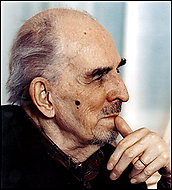 Swedish film director Ingmar Bergman, famous for his unique psychological, dreamlike storytelling style, passed away today in Sweden at the age of 89. Though he has not directed a feature film in many years, discussion of his work by film critics and movie buffs has never really stopped, and much of that discussion revolves around the spirituality of many of his movies.
Swedish film director Ingmar Bergman, famous for his unique psychological, dreamlike storytelling style, passed away today in Sweden at the age of 89. Though he has not directed a feature film in many years, discussion of his work by film critics and movie buffs has never really stopped, and much of that discussion revolves around the spirituality of many of his movies.
Raised as a minister’s son in a strict Lutheran home, much of Bergman’s work dealt with man’s search for meaning and relationship with God in an often cold and alienating world. Though he often disparaged religion in its various forms, movies such as “The Seventh Seal” (1957) as well as the three movies generally known as the Bergman trilogy–“Through A Glass Darkly” (1961), “Winter Light” (1962), and “The Silence” (1963)–all dealt with the question of God’s existence and the role faith plays in human lives.
For all of his early spiritual angst, Bergman’s philosophy slowly devolved into shades of agnosticism. His later films, in the ’70s and ’80s, didn’t have much to do with significant spiritual matters, though spiritual imagery occasionally surfaced. But despite the unraveling of Bergman’s faith, I think many of the questions he asked and the insights he made are valid and worth reflecting on now that a whole slew of new Bergman retrospectives will undoubtedly sprout up in light of his death.
In fact, I think so many of the disturbing trends in pop culture today can be explained with my favorite Bergman quote: “It is my opinion that art lost its basic creative drive the moment it was separated from worship. In former days the artist remained unknown and his work was to the glory of God… Today the individual has become the highest form and the greatest bane of artistic creation.”


